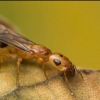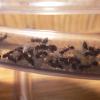If you can get a nice shot of her face so that I can check for a clypeal notch I'll be able to confirm if she's integra-group or sanguinea-group.
These are the best I could get:
Nice pictures - there's definitely a clypeal notch so she's sanguinea-group. We'll have to wait and see what the pupa is then but my money's on a male. Doesn't mean all the rest of the brood is infertile though, again just have to wait and see - fingers crossed. You can probably ID her from the clypeal notch and the margin of the petiole node (looking at it down her back from over her head) to species level.
Alright here is my attempt at an ID, please correct me with any issues that you see. This uses the Key to New England Formica as a reference.
Firstly, according to Antmaps, the species of Formica native to South Dakota:
Formica altipetens
Formica argentea
Formica aserva
Formica bradleyi
Formica canadensis
Formica ciliata
Formica comata
Formica criniventris
Formica dakotensis
Formica hewitti
Formica incerta
Formica integra
Formica laeviceps
Formica lasioides
Formica lepida
Formica limata
Formica montana
Formica neoclara
Formica neogagates
Formica neorufibarbis
Formica obscuripes
Formica obscuriventris
Formica obtusopilosa
Formica oreas
Formica pallidefulva
Formica pergandei
Formica podzolica
Formica puberula
Formica ravida
Formica rubicunda
Formica spatulata
Formica subaenescens
Formica subintegra
Formica subnitens
Formica subsericea
Formica ulkei
Formica wheeleri
Next lets narrow that down to the parasitic species.
Formica aserva
Formica dakotensis
Formica integra
Formica pergandei
Formica puberula
Formica ravida
Formica rubicunda
Formica subintegra
Formica wheeleri
Now lets examine the key for any of these that exist. Firstly, as ReignofRage noted, we can narrow this list down further when we reach Step #4 on the key:
Clypeus notched; ant bi-colored (head and mesosoma reddish-orange, gaster dark); slave-makers (sanguinea group). That leaves:
Formica aserva
Formica pergandei
Formica rubicunda
Formica subintegra
Formica wheeleri
Formica puberula
Moving down the key, we next will evaluate if the queen could be Formica aserva. Few (normally < 6) very short (< 0.06mm) hairs or no erect hairs on dorsum or gaster; petiole large (broad), fan-shaped, and lacking erect hairs on its crest; a northern species found at high elevations in Massachusetts as well as throughout northern New England . . . . . Formica aserva
The issue here is that the petiole is difficult to see and is only visible in the second image. However, we do have a lot to go off of from the first line. In the image there appear to be a lot more than 6 hairs on the gaster, protruding from between the exoskeleton plates. To the best of my knowledge this counts as hairs on the gaster, so my conclusion is this this is likely not F. aserva, although I would need to compare to RushmoreAnt's other colony to be sure.
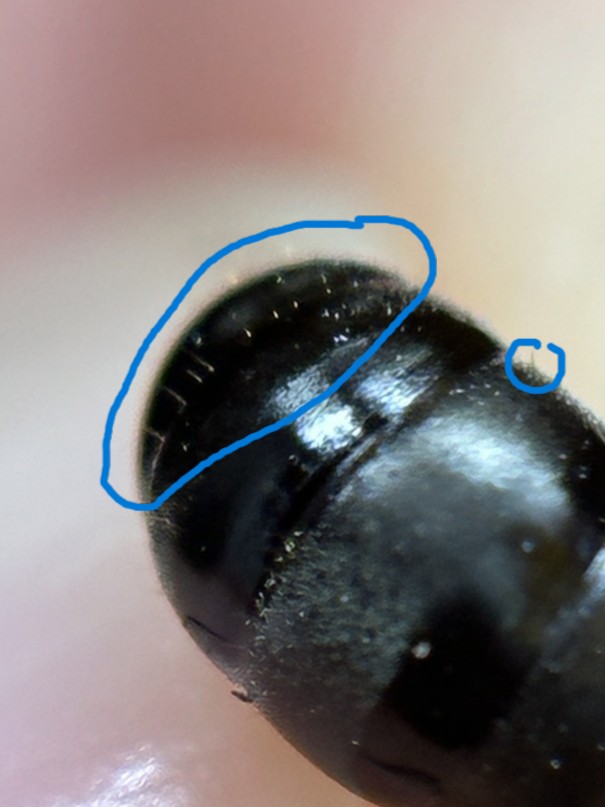
More than 6 longer hairs on the gaster
Mesosoma saddle-backed in profile; erect hairs absent on the propodeum; crest of petiole blunt in profile . . . . . Formica subintegra
The mesosoma is saddle-backed in profile with all parasitic Formica so this is little help in this circumstance. In all of the images it does look like hair is absent from the propodeum as well.
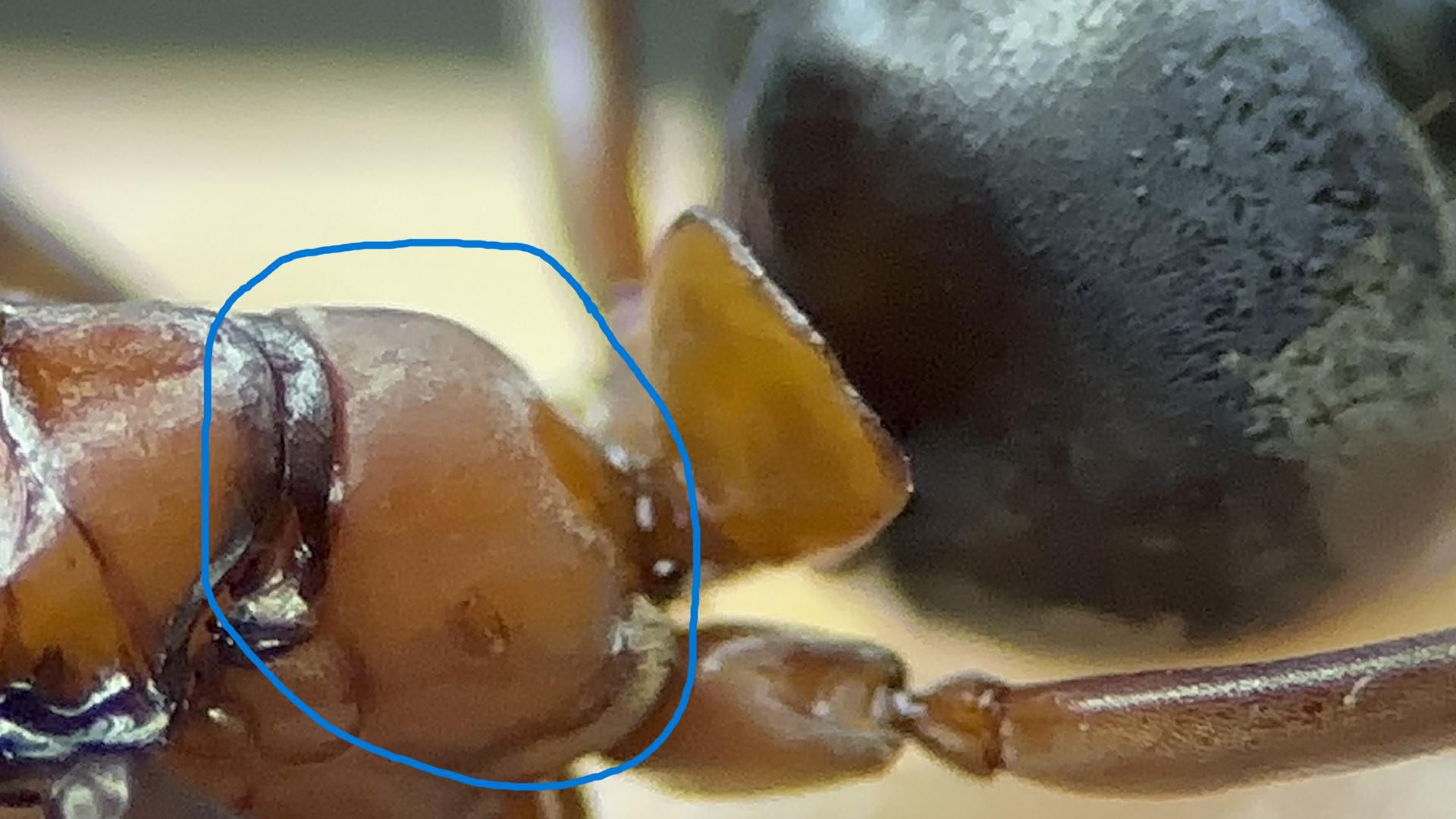
No visible hair on propodeum, although the camera may not have captured them
Finally, and most importantly in my opinion: crest of petiole blunt in profile. The difference is very obvious when comparing Formica subintegra with another parasidic Formica species such as Formica aserva.
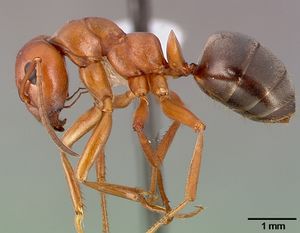
Sharp petiole (F. aserva)
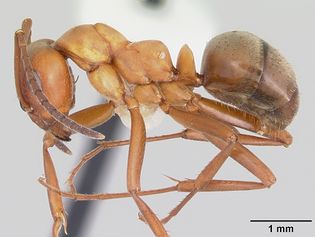
Blunt petiole (F. subintegra)
Here is another example with a queen.
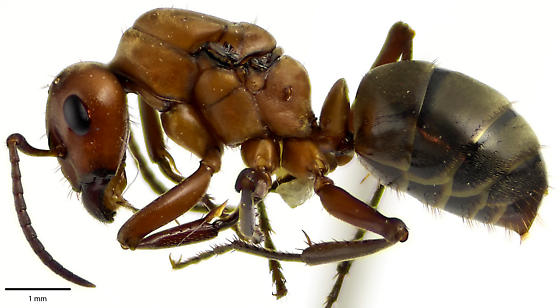
Notice again the stubby petiole
This does check out. In image 4 and 5, you can see the unusually short petiole that is quite flat and stubby at the top. So far, my best guess would be Formica subintegra, but there is more keying to do.
Mesosoma more curvaceous in profile; erect hairs present on the propodeum; crest of petiole sharp . . . . . Formica rubicunda
This is really easily dismissed because of the last clause: crest of petiole sharp. As previously mentioned, RushmoreAnt's queen's petiole is anything but sharp. For further clarification, you can see the image below.
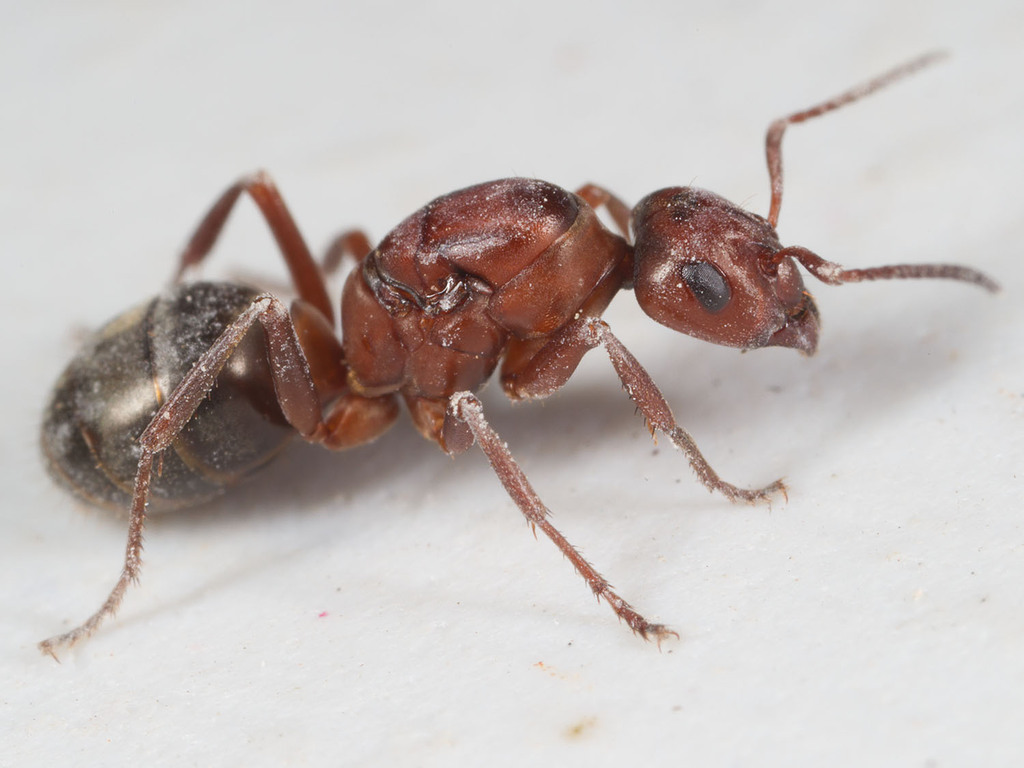
Sharp and thin petiole
Head at least as broad as it is long, and usually broader; scape shorter than length of the head; erect hairs on the gaster > 0.13 mm long and usually longer; hairs on the second gastral tergites dense and closely packed (separated by a distance less than their own length); enslaves neogagates, pallidefulva, and fusca group ants; widespread throughout New England . . . . . Formica pergandei
While it is not immediately obvious if the head is broader than it is long in image 3, what is certain is that there are few or no hairs on the second gastral tergite. I am not completely sure what to count as a tergite here, perhaps someone could help? Do you count from the first exoskeleton plate on the abdomen or is that distinctly the post petiole, a different thing all together. At any rate, densely packed hair is not something this queen has.
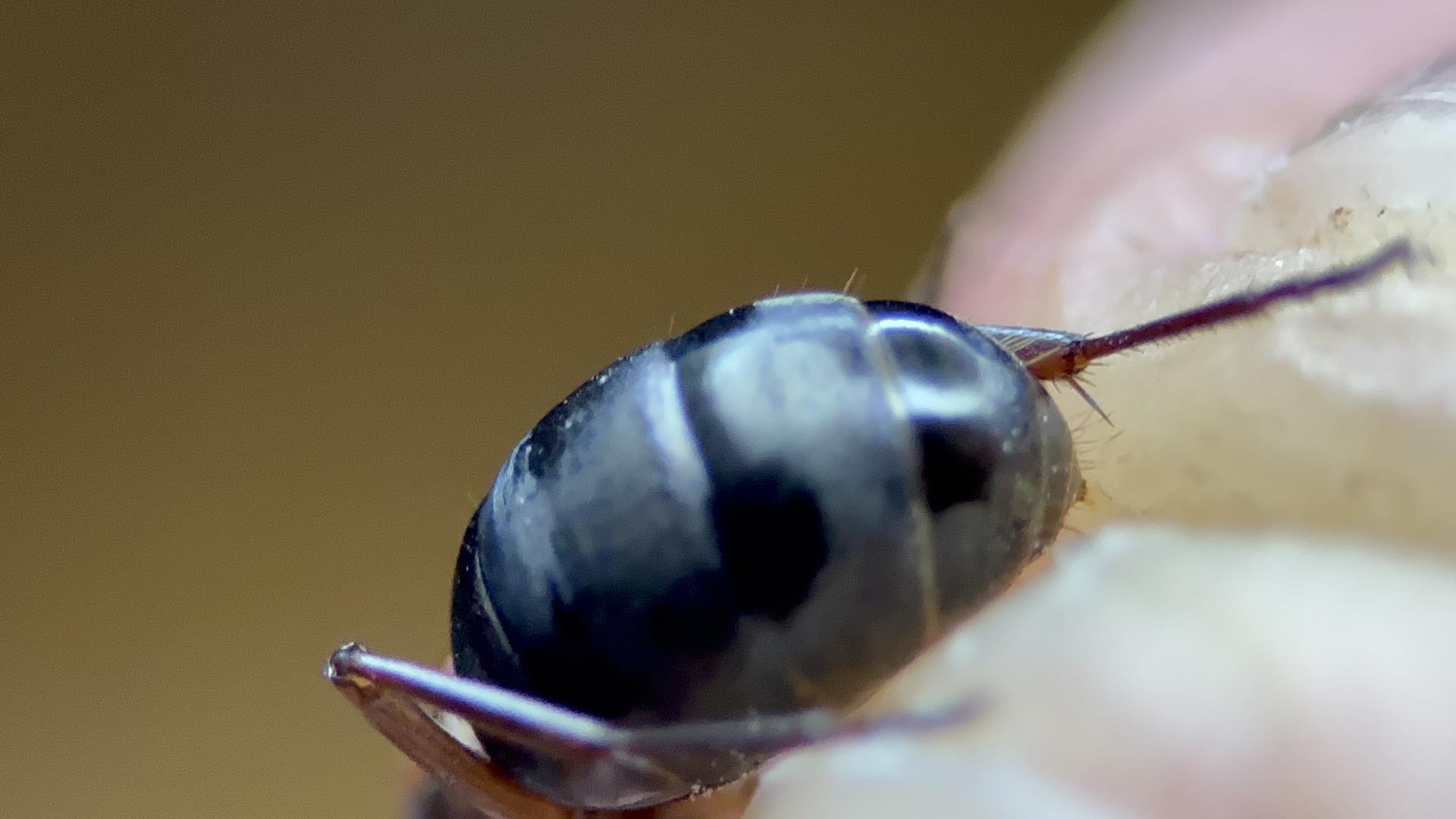
Little to no hair
Neither Formica wheeleri nor Formica puberula are on the Antwiki Formica key, so I cannot be too certain about them. However, here are my thoughts.
Formica wheeleri appears to be super rare. As far as I know, no queen has ever been caught and only workers have been photographed, so there is little to go off of. Instead, I will use the description given on Antwiki.
The petiole of this species has a blunt apex and is wide as seen from the front. The head is often darker than the mesosoma. The underside of the head usually has a pair of erect hairs. The hairs on the gaster are about 0.1 mm long, and are moderately fine, mostly sharp-tipped. Those on the pronotum are shorter, thicker and at least a few are blunt-tipped. The eyes are large, extending past the sides of the head in most workers. (Mackay and Mackay 2002)
The blunt apex we have already seen and the petiole looks quite wide when seen from the front, see image 4 in the original post. The head is indeed darker than the mesosoma.
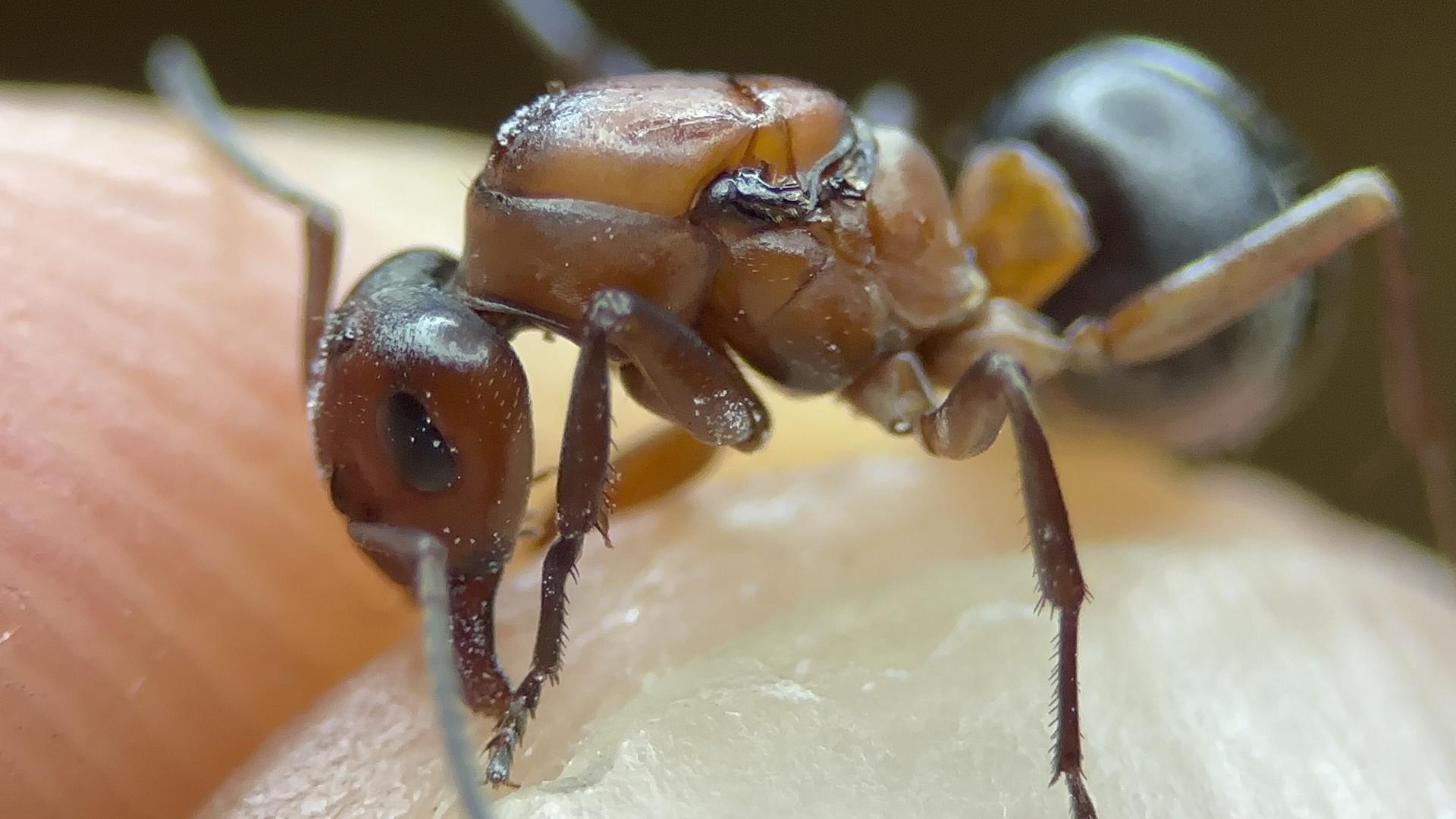
Darker head
While I cannot measure the hair on the abdomen, they do appear to be sharp. Let me know if you agree.

Sharp hair
However, I am uncertain about the hair on the pronotum. If you look at the 2nd to latest image, you can see at least one hair on the pronotum, and it kind of looks shorter and blunter? I think a better camera is necessary though to fully make sure. Looking at images 3 and 4 in the original post as well, it does appear the eyes of the queen are well to the side of the head. This queen could possibly be F. wheeleri, but it still seems that subintegra is the best fit. If you are a myrmecologist or expert though, I would really love to know how you would distinguish between these species.
For Formica puberula, I am using the same method to ID as the F. wheeleri.
The scape of this species has appressed to suberect, relatively coarse hairs, giving it a slight bristly appearance. The underside of the head has at least a pair of hairs. The erect hairs on the gaster are about 0.1 mm long, and are of about the same form and density as those on the pronotum. Most hairs have sharp tips. (Mackay and Mackay 2002)
The antenna are not visible enough in the images to judge the hairs on them, and neither is the underside of the head. However, the gaster hairs do not appear to have the same density as the hairs on the pronotum, although a better image is necessary to be positive.
In the end, I think F. subintegra has the most positive evidence for it being the species, although F. wheeleri seems quite close. Please let me know what you think though and any constructive criticism of my methods is needed!
Ants_Dakota
Edited by Ants_Dakota, April 30 2025 - 7:51 PM.













